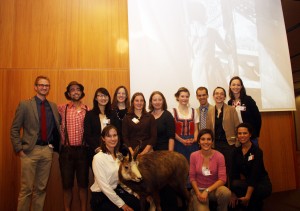by Mark Staples
Day 4 marked the beginning of the second half of INC5. A lot of work remains to be done before a global mercury treaty can be agreed to, and the delegates were eager to get down to work in their contact groups.
Supply and Trade, ASGM, & Waste
Work continued on Article 3 concerning supply and trade in the selected technical articles contact group, focusing specifically on the notification requirements for mercury export and import. Delegates debated the merits of a mechanism similar to prior informed consent from the Rotterdam Convention applied to the mercury trade. While such a mechanism would give importing states more control over the mercury trade, some delegates argued that it would be too burdensome. There was also debate concerning whether or not the trade restrictions should apply to mercury compounds in addition to elemental mercury.
As the contact group worked late into the night, they were expecting to hear back from drafting groups on alternative and small-scale gold mining (ASGM) issues and primary mercury mining, and intended to finish their mandate before breaking for the night.
Products & Processes
Because they were occupied with supply and trade and ASGM issues, the contact group did not devote much time to the product and processes text. However, co-chair Abiola Olanipekun did introduce CRP 14 in the afternoon plenary, which despite many remaining brackets, will be sent to the legal group for polishing before reconsideration in the contact group.
Financial & Technical Assistance
Article 15 on financial assistance was discussed in morning plenary, with all countries agreeing that a special financial regime is needed to assist countries in implementing this convention. While finances have historically been considered a “developed vs. developing” country issue, Switzerland made the point that effective finance is in all parties’ interests. After only short discussion, Article 15 was sent to a contact group that will meet tomorrow.
After a day of small-group negotiations, a revised Article 16 on capacity building, technical assistance, and technology transfer was presented as a package to our contact group. With only a few hurdles, it was fully accepted and was presented in this afternoon’s plenary session. Chair Lugris thanked this contact group for setting the tone of progress as he sent the article off to the legal group.
Institutions & Implementation
In the morning, a separate contact group was convened to work on sections of the treaty text related to definitions, institutional linkages, and implementation—an ambitious set of topics. Before lunch, the group set to work on the definitions of mercury, mercury compounds, mercury-added products, and use allowed. While it might seem like these definitions should be fairly obvious, delegates were on the lookout for any technical or legal ambiguities that could leave the door open for loopholes or non-compliance. Definitions were agreed upon for most of these terms, with the exception of “use allowed.” In the evening, the group divided into even smaller working groups for informal negotiations on the question of implementation/compliance/implementation and compliance committees.
Emissions & Releases
Delegates working on emissions had a productive day, generating papers on what kinds of mercury emissions sources will be included in the treaty, and making progress on the issue of releases to land and water.
Annex F on the included emissions sources is now nearly complete. “Sources included” now refers specifically to point sources from major agreed-upon categories, with only two categories still up for debate: iron and steel (and secondary steel), and open burning. The group seemed to reach a consensus on control measures for new sources, and is currently discussing the complex issue of addressing existing sources.

The MIT team enjoys a Swiss Break with some new friends. Photo credit: Earth Negotiations Bulletin: http://www.iisd.ca/mercury/inc5/
At the Swiss break, chocolate incentives were offered to spur the delegates. In the emissions contact group, the chair brandished the reward, and good-naturedly warned the delegates that he would eat all the chocolate himself if they did not finish the draft text on emissions promptly.
Afternoon Plenary
In an address to the plenary, UNEP Executive Director Achim Steiner, along with Swiss Environment Minister Doris Luethard, urged delegates to forge ahead and to do their best to reach agreement on the treaty text by Friday. The Minister pledged 1 million Swiss Francs as an interim contribution to the future convention on behalf of the Swiss government, and the governments of Norway and Japan each matched the pledge.
The objective is to have the draft text complete by today, Thursday, at lunch in order to complete the treaty by 6pm on Friday. Will they make it? Stay tuned to find out! We’ll be eagerly following the proceedings on Twitter (@MITMercury) and here on our blog.
